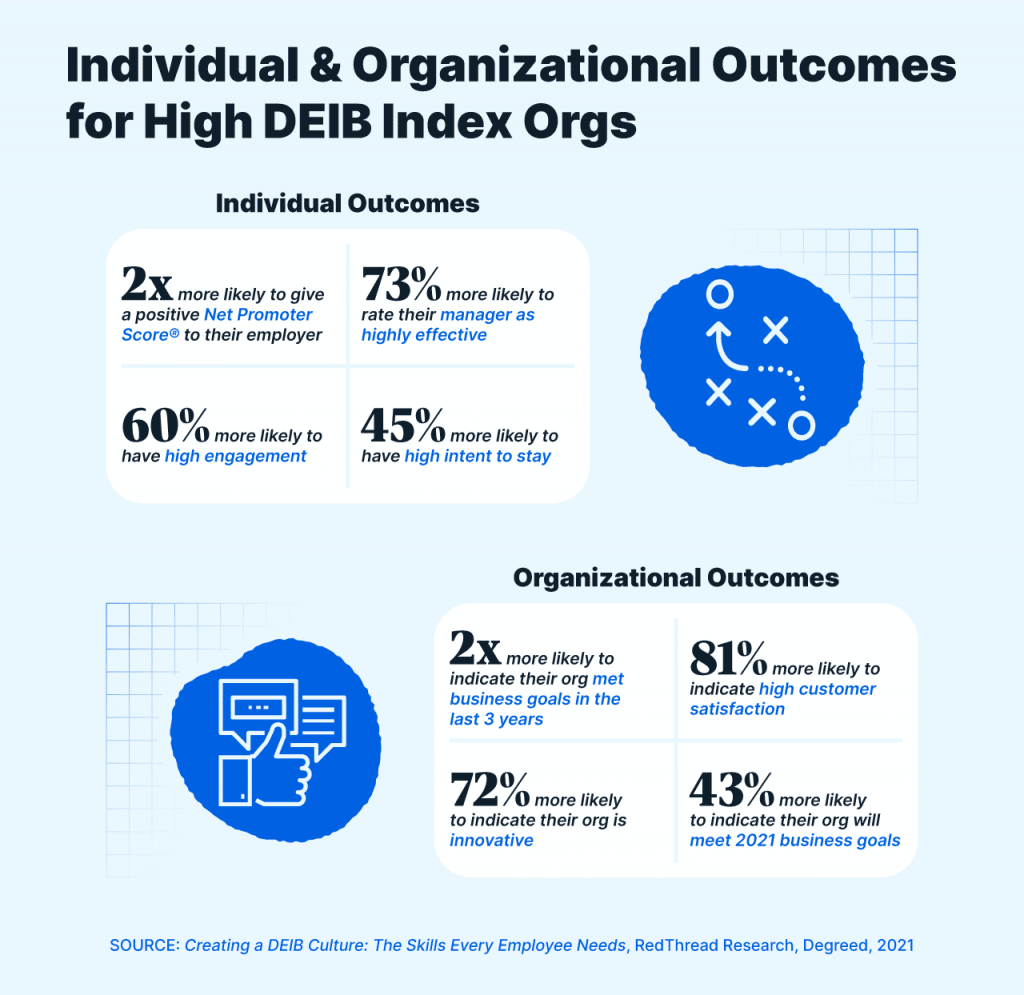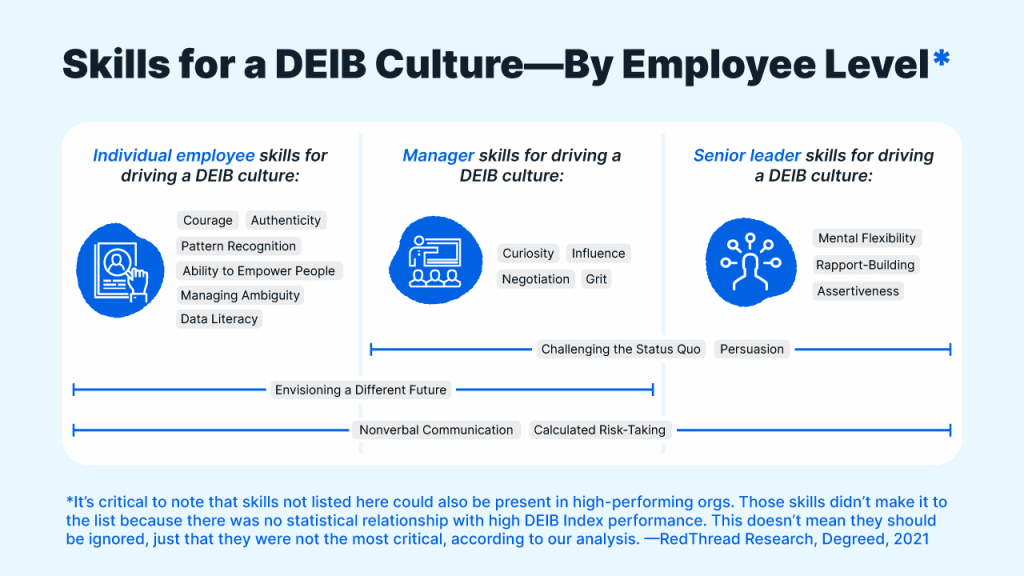Business and learning leaders are focusing on diversity, equity, inclusion and belonging (DEIB) more than ever. Amid the COVID-19 pandemic, social justice movements, and the accelerating Great Resignation, decision-makers are increasingly aware of how diverse populations experience life and work — and how that impacts DEIB in the workplace.
One example happening in real-time relates to women impacted by the pandemic. The employment of women — and especially women of color — declined more than the employment of men. And it still hasn’t fully recovered, with women’s employment now about 2% below what it was before COVID-19. At Degreed, we’re looking to change that.
With consumers and employees calling for more accountability and diversity, expectations for companies are changing. And yet, companies still aren’t as diverse, equitable and inclusive as they could be. If you look at the representation levels across organizations, it’s clear that current DEIB investments and training aren’t yielding enough research or results to bring about equitable change. We know that DEIB in the workplace matters. But a lack of clarity on the relationship between DEIB and business outcomes persists.
Business Outcomes for DEIB
In collaboration with RedThread Research, we sought to understand the relationship between a strong DEIB culture and business outcomes. In a six-month study, researchers reviewed more than 60 articles, spoke with over 100 individuals, and conducted a comprehensive survey of more than 1,000 people.
Then, the team created a DEIB index that measures how diverse, equitable and inclusive an organization is based on respondents’ input.
More specifically, the index measures the extent to which people:
- Feel they belong and are respected, included and valued.
- Think their company provides equitable opportunities and embraces diversity.
Next, researchers surveyed respondents on individual outcomes:
- Their organization’s Net Promoter Score® (NPS).
- Their impression of manager effectiveness.
- Their level of engagement.
- Their intent to stay.
And they asked respondents about organizational outcomes:
- If their organization met or exceeded business goals in the last three years.
- If their organization is on track to meet or exceed business goals for 2021.
- If their organization has high customer satisfaction.
- If they describe their organization as innovative.
Then, researchers looked for statistically significant relationships between these measures. What did they find? When an organization has a strong DEIB culture, it has better business outcomes.
Specifically, respondents were two times more likely to indicate meeting business goals in the last three years. In addition, they were 72% more likely to indicate that their organization is innovative and 81% more likely to indicate high customer satisfaction.

Regardless of the business outcomes of a strong DEIB culture, workers want and are prioritizing diverse work environments when considering a new opportunity.
Indeed, 80% of survey respondents in a Deloitte study said inclusion efforts were an important factor when choosing a company to work for. Likewise, researchers found that high DEIB Index scores correlate with people’s intent to stay at their organizations. Why is this important? Companies with lower turnover rates average profits four times higher than those with high turnover. It pays to listen to your people when they share what will keep them at your organization.
A strong DEIB culture is valuable in ways other than retention too. Researchers found that individuals at an organization with a strong DEIB culture were twice as likely to give a positive NPS to their employers and were 60% more likely to be highly engaged at work.
After finding out the relationship between DEIB and business outcomes, we wanted to identify what skills are needed for a strong DEIB organization. So, researchers surveyed workers of all levels from a wide range of industries on what the most important skills are for individuals, managers, and senior leaders to create a strong culture of DEIB in the workplace.
Enabling DEIB in the Workplace
When we started our study, we discovered there wasn’t a set standard on what to do if you wanted to prioritize DEIB in the workplace today.
We know that the present methods of DEIB training aren’t effective. Current training usually focuses on the legality of DEIB in the workplace and is oftentimes mandatory. Yet, there aren’t any substantial results to show this positively impacts women’s careers or those of other underrepresented populations.
Another popular method of enabling DEIB in the workplace is creating and promoting employee resource groups (ERGs), worker-led cohorts that champion DEIB efforts. But there’s little research showing a connection between ERGs and positive changes in the representation of roles.
While these two approaches are a start to creating a strong DEIB culture, they alone, unfortunately, aren’t creating substantially more diverse, equitable and inclusive organizations.
Skills and DEIB
If those pervasive approaches aren’t effective, what is? Embracing skills. Specifically, learning and applying skills that are critical to creating and maintaining a strong DEIB culture.
What are these skills? Most organizations haven’t identified the skills necessary to develop a strong DEIB culture. Even when organizations have identified leadership skills relevant to DEIB, more than likely they haven’t processed how to apply those skills in a DEIB context.
This research changes that.
Researchers found that in senior leaders, interpersonal skills are most important, reflecting the amount of interpersonal work required by the leaders to drive DEIB in the workplace. In managers, skills that allow them to remain open to new ideas, drive and monitor change, and navigate social complexity are vital. And in individuals, authenticity, influencing others, and recognizing patterns are key.

When we asked “What skills matter?” for DEIB, we knew the answer would differ for each level of responsibility across each organization. But understanding which skills are most important for all employees to have (and which are key for certain roles), is an effective way to drive change in your DEIB culture.
It’s not enough to talk about DEIB in the workplace. Skills are needed to bring DEIB to life.
Want to Learn More?
Download our latest research report in collaboration with RedThread Research, Creating a DEIB Culture: The Skills Every Employee Needs to identify what skills you need to drive a strong DEIB culture at your organization.
